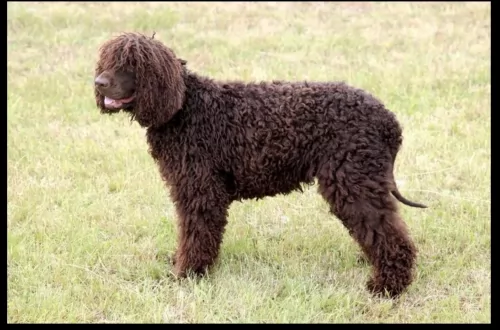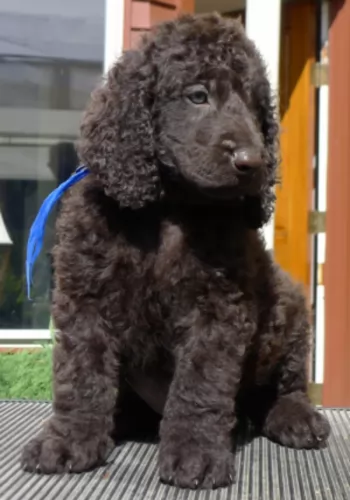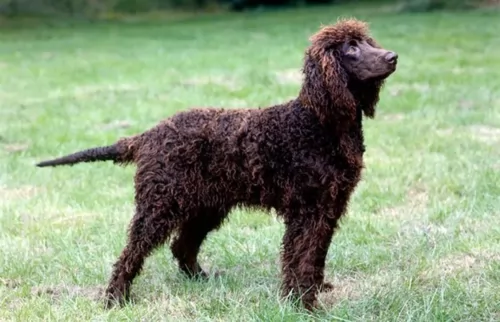 Petzlover
Petzlover English Setter is originated from United Kingdom but Irish Water Spaniel is originated from Ireland. English Setter may grow 10 cm / 4 inches higher than Irish Water Spaniel. English Setter may weigh 50 kg / 111 pounds more than Irish Water Spaniel. English Setter may live 3 years more than Irish Water Spaniel. English Setter may have less litter size than Irish Water Spaniel. Both English Setter and Irish Water Spaniel requires Moderate Maintenance.
English Setter is originated from United Kingdom but Irish Water Spaniel is originated from Ireland. English Setter may grow 10 cm / 4 inches higher than Irish Water Spaniel. English Setter may weigh 50 kg / 111 pounds more than Irish Water Spaniel. English Setter may live 3 years more than Irish Water Spaniel. English Setter may have less litter size than Irish Water Spaniel. Both English Setter and Irish Water Spaniel requires Moderate Maintenance.
 The English Setter seems to have been a hunting dog in England as far back as the 15th century. These dogs were known to be ‘setter types’ – hunting dogs that ‘set dogges’ – to set or point at game birds. It is believed that the English Setter is a cross of the Water Spaniel, Spanish Pointer and English Springer Spaniel. In the late 1500’s Sr. Johannes Caius, a sportsman, announced to his friends that there was a new dog our of France for hunting. He then describes an English Setter.
The English Setter seems to have been a hunting dog in England as far back as the 15th century. These dogs were known to be ‘setter types’ – hunting dogs that ‘set dogges’ – to set or point at game birds. It is believed that the English Setter is a cross of the Water Spaniel, Spanish Pointer and English Springer Spaniel. In the late 1500’s Sr. Johannes Caius, a sportsman, announced to his friends that there was a new dog our of France for hunting. He then describes an English Setter.
Then in the early 1800’s Rev. Harrison of Carlise sold a couple of setters to Mr. Laverack. This pair is the foundation for the breed of English Setters. Without really knowing, Laverack claimed that this line he was breeding from had been pure for 35 previous years. He inbred his male and female for many years and did well in confirmation and field trials.
Then in 1874 the first English Setters were imported to the US from this Laverack line. Mr. Llewellin then crossed the best dogs in the Laverack line with his dogs and eventually produced winning champions Armstrong Dash II and Dashing Bondhu. This led to the “Dashing Bondhu” or the Llewellin line of English Setters. This is why the English Setter is sometimes referred to as the Llewelllin or Laverack Setter.
The setter group to which the English setter belongs includes the Irish Setter, the Gordon Setters and the Irish Red and White Setter. The English Setter, as well as the others, were bred to hunt birds such as pheasant and quail. It was the job of the setter to find the prey and point it out to the hunter after it had been shot. They were also used to flush the birds from the brush so that the hunter could then release hawks to take down the prey. The English Setter is methodical and systemic in their approach.
By the 1600’s this working dog had become the breed of the landed gentry and shooting game was their pastime. These nobles did not use hawks to capture the prey but rather shot them after the English Setter flushed them out. The English Setter is very popular today both as a hunting dog and as a family pet. The English Setter is bred for athleticism and endurance. The have both AKC and UKC certification.
 The Irish Water Spaniel is one of the larger spaniel types and also one of the oldest.
The Irish Water Spaniel is one of the larger spaniel types and also one of the oldest.
He is sometimes referred to as the Southern Irish Water Spaniel. Hailing from Ireland, the precise origins of the dog aren't altogether sure. It is believed that the dog came from other dogs from Persia and there are references to these water dogs from as early as 1600.
The modern breed was developed in Ireland in the 1830s. The breed's purpose is that of a hunter of waterfowl and he swims strongly.
The Irish Water Spaniel was recognized by the AKC in 1884. In 1890 the Irish Water Spaniel Club was formed.
 The English Setter is very much a setter in his looks. He is medium in size and was bred to hunt by following airborne prey over a large expanse of ground. He has to have both speed and stamina. He also has to run with his head up watching the prey in the air.
The English Setter is very much a setter in his looks. He is medium in size and was bred to hunt by following airborne prey over a large expanse of ground. He has to have both speed and stamina. He also has to run with his head up watching the prey in the air.
He has a slight dome shaped head and a long muzzle with dark, gentle eyes. The ears have their tips lined up with the eyes, the neck is long and muscular. He shows powerful hindquarters and a fairly long tail.
The coat length is medium and silk. The ears, chest, neck and legs are feathered, as is the tail. The hunting version has a shorter, finer coat than the show dog. The show dogs’ coats are flowing and long. Both types have a white coat with Belton or ticking. The Belton can be black, orange, lemon, liver and the tricolor. This is the liver or blue Belton but there are tan markings on the legs, chest, and face. It was Laverack who named the ticking Belton after a village in England.
 A peculiar feature of this dog is its hairless tail which is partly covered in curls which the rest is all but hairless, giving him the nickname of Rat Tail or Whip Tail.
A peculiar feature of this dog is its hairless tail which is partly covered in curls which the rest is all but hairless, giving him the nickname of Rat Tail or Whip Tail.
Looking much like a Poodle with his tight oily curls, the Irish Water Spaniel is a medium to large sized purebred dog, a robust, compact built dog with a skull which is shaped like a dome.
The muzzle is longish, the eyes dark brown and intelligent looking and the ears are long and floppy.
His hair is thick and curly and it sheds very little so that the dog is regarded as being hypoallergenic. The medium length coat is a dark brown, liver color with fairly tight curls that may even tend to cover the eyes.
It is interesting to note that he has webbed feet, which is useful for when the dog swims.He stands at roughly 51cm to 61cm and weighs between 25 to 30kg.
Temperament in any dog is affected by socialization and the way the human owner raises the dog. The Irish Water Spaniel is a water loving dog, being active and energetic.
He is an intelligent dog and easy to train and socialize. When trained he becomes such an obedient dog. He has also got a light-hearted side to him and is actually known to be quite amusing and clownish, providing plenty of laughs for you.
They make good family dogs, getting on well with children in the home as well as with other pets. They're also able to make good guard dogs, taking the protective roles seriously. He isn't an aggressive dog but he has a warning bark that can be a good warning to intruders.
 The AKC standard for the English Setter breed describes him as a “Gentleman by Nature” and that might be all you need to know about this delightful dog. They are people-oriented and settle right down with their families if they get enough exercise. With proper stimulation they become couch potatoes when you bring them in at night.
The AKC standard for the English Setter breed describes him as a “Gentleman by Nature” and that might be all you need to know about this delightful dog. They are people-oriented and settle right down with their families if they get enough exercise. With proper stimulation they become couch potatoes when you bring them in at night.
They are very friendly with everyone but are especially happy when playing with children. You can trust them with your other pets, children of all ages and anyone coming to your front door. They are not guard dogs. However, they can have a stubborn streak, they can be strong-willed. This is especially true the more working than show stock they are. In addition, they are intelligent, calm and quiet in the house.
 Your active Irish Water Spaniel just loves water so you can count him in whenever you go swimming. That is one characteristic of the Irish Water Spaniel – he just loves to be involved in all the action you're busy with.
Your active Irish Water Spaniel just loves water so you can count him in whenever you go swimming. That is one characteristic of the Irish Water Spaniel – he just loves to be involved in all the action you're busy with.
He makes an ideal family pet for an active family, and he will be a loyal and devoted pet who will provide a lot of fun to your family with his mischievous side.
He is confident, independent and strong willed so first time dog owners should bear this in mind. He is essentially just a fun loving, busy dog and if you make sure to exercise him well and make sure he is a participating member of your family, he'll be your most loving and devoted friend.
 English Setters, like many other breeds that have a base white coat, can be affected by congenital deafness. A test done by LSU in 2010 showed the 12.4% of the dogs they tested were affected by this. They are also prone to:
English Setters, like many other breeds that have a base white coat, can be affected by congenital deafness. A test done by LSU in 2010 showed the 12.4% of the dogs they tested were affected by this. They are also prone to:
Most of this is caused by autoimmune thyroiditis or a condition where the immune system attacks its own thyroid gland.
The primary cause of death after ten years old
 A generally healthy breed, the Irish Water Spaniel, just like with most other dogs, can fall prey to some of the more common dog ailments of which hip dysplasia is one.
A generally healthy breed, the Irish Water Spaniel, just like with most other dogs, can fall prey to some of the more common dog ailments of which hip dysplasia is one.
Bone and joint problems like this can lead to lameness even in young dogs.
Eye diseases are also a problem, and cataracts can form in the eye, particularly when the dog is older and create a cloudy look to the eye. It's not painful for the dog.
Hypothyroidism, a treatable hormonal disorder is another disease worth being aware of.
 The English Setter is a hard working dog and should be fed accordingly. Puppies should be fed three times a day and adults twice to avoid bloat. Watch your English Spaniel though as they love to counter surf.
The English Setter is a hard working dog and should be fed accordingly. Puppies should be fed three times a day and adults twice to avoid bloat. Watch your English Spaniel though as they love to counter surf.
In addition to the conditions listed above the English Setter is prone to:
Caused by excessive exercise before or after having eaten a large meal. It is suggested that you feed your English Setter twice a day, smaller meals and not right before or after strenuous exercise.
Keep her ears clean and check regularly for infections.
The English Spaniel needs exercise on a routine basis – every day walks are best along with some time to just run either in a fenced yard or dog park. Take her jogging, running alongside your bike, hiking or just long walks. They do well with lure coursing, agility, confirmation, obedience and rally.
 Your Irish Water Spaniel requires quite a bit of grooming that will involve his coat, his nails, his teeth and his ears. The double coat doesn't shed much so it can be easily maintained by brushing the coat twice a week.
Your Irish Water Spaniel requires quite a bit of grooming that will involve his coat, his nails, his teeth and his ears. The double coat doesn't shed much so it can be easily maintained by brushing the coat twice a week.
It can help your water spaniel to look good by sending him in to a doggy grooming parlor to have his curls neatened. This is a dog that loves water and swimming, and you will need to check the inside of his ears for dampness, wax build-up and debris. This can all combine to cause nasty ear infections.
The dog is energetic and will need to be exercised. Take him for walks, play ball games with him and allow him to go on hikes with you or to go swimming. He loves being involved in all your activities as he is a social, active dog.
Highly energetic, it will be important to feed your Irish Water Spaniel with food that enhances his energy levels. There are some good quality commercially manufactured dog foods on the market. Choose one that caters for active, athletic dogs such as the Irish Water Spaniel.
Dry kibble is more recommended to prevent canine tooth decay. Mix in some home cooked foods from time to time such as cooked chicken, rice, pasta and vegetables and try to include some raw meat every now and then as well. Make sure he has constant access to fresh, cool water.